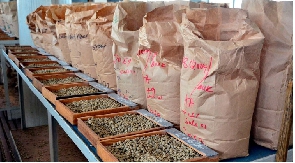Kenya exported the largest volume of coffee in 14 years in May boosted by increased local production attributed to favourable weather in gains that may be eroded by the State’s suspension of trading permits.
Fresh Central Bank of Kenya (CBK) data shows the country exported 6,447 tonnes in May, the highest quantity of exports since May 2009 when the exports stood at 7,401 tonnes.
The coffee was sold at Ksh4.83 billion ($33.84 million) translating to Ksh750,543 ($5,257) per tonne. It is the highest value of the beans since August 2022 when a tonne fetched Ksh764,990 ($5,358).
Kenya has in recent months enjoyed a sharp growth in coffee production, and in the financial year 2021/22, coffee production rose by 50.24 percent, which was the highest crop recorded per year in two decades.
The national production rose from 34,512 tonnes of coffee in the 2020/21 crop year to 51,853 tonnes in 2021/22, according to data from the Coffee Directorate.
The auction volumes increased from 25,126 tonnes (407,432 bags) to 38,890 tonnes (630,646 bags).
Further, direct sales volumes increased from 10,444 tonnes (174,806 bags) to 11,841 tonnes (197,341 bags).
Coffee firms benefited from the bumper harvest that pushed up their earnings.
Eaagads, a coffee seller listed at the Nairobi Securities Exchange (NSE), for instance, earned a net profit of Ksh10.88 million ($76,217) for financial year ended March, a 14 percent increase from Ksh9.53 million ($66,760) last year.
The company attributed the performance to increased coffee sales which saw its revenue jump to Ksh234 million ($1.64 million) from Ksh142 million ($994,746).
“In the year under review, the company achieved sales of 348 tonnes of coffee compared with 185 tonnes in March 2022,” said the firm.
“The increase was mainly attributed to the favourable weather experienced in the year which enhanced bean development.”
The sector has, however, ground to a halt in recent weeks after the government suspended coffee trading licences for all traders as the government eyes reforms to get rid of cartels.
The auction at the Nairobi Coffee Exchange (NCE) has not run for more than four weeks, leaving farmers stuck with piles of beans they can’t sell.
Farmers are worried that the stockpiles will see prices plummet when trading resumes, exposing them to losses.
The hiatus in coffee trading is also a hit to the government, with exports one of the major sources of foreign exchange at a time the country is battling a rising import bill and foreign debt payment obligations.
“The government had promised to extend existing marketing and brokerage permits by three months up to September through a gazette notice but that hasn’t happened,” an industry source told Nation last week.
Africa Business News of Thursday, 3 August 2023
Source: theeastafrican.co.ke
Kenya coffee export volume up to 14-year high on yield
Entertainment












